May 19, 2017
Edited by David Sanders
Specimen Days
1048—Omar Khayyám, Persian mathematician, poet and philosopher (d. 1131), is born.
1898—Juan J Domenchina, Spanish poet/interpreter (sombra desterrada), is born.
1909—George Meredith, English poet/writer (Diana of Crossways), dies at 81.
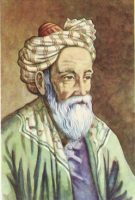
Oh, come with old Khayyam, and leave the Wise
To talk; one thing is certain, that Life flies;
One thing is certain, and the Rest is Lies;
The Flower that once has blown forever dies.
—from The Rubaiyat Of Omar Khayyam
[Translated by Edward FitzGerald]
“One thing is certain, that Life flies; / One thing is certain, and the Rest is Lies;” – Omar Khayyám
World Poetry
Here is the Poem that Got a Newspaper Prosecuted for Blasphemy. Will the NZ Government Act Again?
Many, including the PM, were surprised this week to learn that blasphemy remains an offence under NZ law. The one and only case of prosecution dates from 1922, when John Glover was prosecuted in the Supreme Court for republishing in his paper the Maoriland Worker the anti-war poem ‘Stand-to: Good Friday Morning’ by Siegfried Sassoon.
‘My Tears Not My Weakness’, Woman Police Officer Responds Through A Poem, IPS Association Seeks Action Against MLA

The woman IPS officer who was seen being pulled up publicly by a BJP MLA has responded through a poem posted on her facebook account and said her tears should not be seen as a sign of her weakness. IPS officer Charu Nigam was reduced to tears after BJP MLA Radha Mohan Das Aggarwal got into a heated argument with her over evicting protesters.
An Indian Police Service officer posted a poem on her Facebook saying her tears should not be seen as a sign of weakness.
Recent Reviews
The Five-Star Delight of Driving Across America with Ron Padgett
At the heart of Padgett’s writing is an innocence: he sees everything — no matter how banal or how curious or strange — with the same attentive, innocent eye.
by John Yau
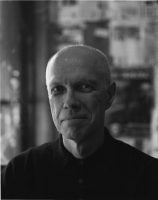
If you saw Jim Jarmusch’s Paterson (2016), you know that Ron Padgett wrote four new poems for this wonderful film. You also know that the film is the story of a bus driver-poet named Paterson who lives in Paterson, New Jersey. If, in addition to seeing this movie, you have played Trivial Pursuit more than a handful of times, or taken a class in Modern American Poetry, you are likely know that Paterson, the name of an unremarkable city on the Passaic River, is the title of William Carlos Williams’ epic, five-volume poem, and that Williams was Robert Smithson’s doctor when he was growing up in Passaic.
If you saw Jim Jarmusch’s Paterson, you know that Ron Padgett wrote four new poems for this wonderful film.
Broadsides
“It gets people killed”: Osip Mandelstam and the Perils of Writing Poetry under Stalin
The cat-and-mouse game between the poet Osip Mandelstam and the Soviet dictator could only end in death.
by Eimear McBride

One of the most revealing photographs of Osip Mandelstam still in existence is a mugshot taken in the Lubyanka, on the occasion of his first arrest, in 1934. In the side-on view, it’s of little significance: he looks like any balding 1930s labourer from almost anywhere. Face on, though, arms folded and lips firmly pursed, he presents another proposition entirely. In this shot Mandelstam looks directly into the lens as though he is staring down the photographer. His eyes conceal any trace of the fear that must have been coursing through him; rather, his expression is the very manifestation of contempt. It is the face of a man who has never and will never let anyone, including himself, off the hook.
Why Czeslaw Milosz Still Matters
by Andrzej Franaszek
In 2011, on the centenary of the birth of the Polish poet Czeslaw Milosz and seven years after his death, a conference about his life and work took place in Sejny, a small town on the Polish-Lithuanian border. Because I had just written his biography, I was invited to discuss “Native Realm,” an autobiographical work, written over half a century before. The book relates his own life experiences, yet at the same time stands as a biography of an intellectual from the eastern — or, as we Poles prefer to put it to differentiate ourselves from Russia, the central — part of the continent. In that book and elsewhere, Milosz wrote powerfully about totalitarianism, anti-Semitism and nationalism, the topics that occupied European intellectuals for much of the 20th century.
Why is Pop Music the People's Poetry? That's What They Like
by Adam Bradley
Poems top the Billboard Hot 100: This week, Bruno Mars’ “That’s What I Like” wrested the No. 1 spot from Kendrick Lamar’s “Humble.” The two songs are a study in pop contrasts. On “Humble,” Lamar is confrontational and uncompromising. On “That’s What I Like,” Mars is playful, even silly. Despite their vast differences in tone, however, both songs are poetry.
The Disasters of War
by James Fenton
It comes as a surprise to a British reader to find World War I routinely referred to, by Americans, as America’s “forgotten war.” The British would never use such a term. It is true that certain significant aspects of the war have faded from the collective memory. Every one of us can remember why World War II was fought (“Hitler had to be stopped”), but few can do the same for World War I. Yes, the archduke had been shot in Sarajevo, but who the archduke was, and why his assassination led to general war, and why the war was or wasn’t worth fighting—that takes a rarer expertise to answer.
“It gets people killed” – Osip Mandelstam on writing under Stalin
Drafts & Fragments
Irishman Recites Gibberish Gaelic Poem at Iranian House Party
William Meara is an adventure traveler and last year found himself at a friendly gathering at a house in Shushtar, Iran.When asked to perform his party piece after dinner, William treated his hosts to a lovely Irish poem in his native Gaelic tongue. The only thing is, the poem was complete gibberish and was made up of a collection of Gaelic words and phrases which, when combined, made no sense whatsoever. Still, it sounded wonderful.
Con Artist Faces Jail for Fraud after Claiming to Be the Twin Daughters of TS Eliot
by Robert Mendick
Alison Reynolds pretended to be both Claire and Chess Eliot, who she claimed were the twin daughters of the poet. In fact, Eliot never had any children. Reynolds, who is remanded in custody and facing a jail sentence, used wigs, stage make-up and a variety of costumes to portray herself as at least 11 different aliases over the course of a decade.
Driftwood Haiku on the Bronx Riviera
by Alex Vadukul

On a quiet beach on City Island, the small waterfront community off the eastern tip of the Bronx, David Ellis and his 6-year-old son walked up to a piece of driftwood with a poem painted on it. Mr. Ellis read it aloud: “One Love: Giving thanks and praise we are one under the sun spirit of the earth.”
“I wrote this one last summer,” he said. “This survived the winter and snow.”
“One Love: Giving thanks and praise we are one under the sun spirit of the earth.” – Haiku written on driftwood
Poetry In the News
'What an embarrassment!' Fury at Left-wing Poet's Newsnight Performance on 'State of UK'

A performance by poet Kate Tempest on BBC’s Newsnight prompted a furious social media reaction after viewers branded her a symbol of “left-wing victimhood politics”. Twitter users complained as the performer proclaimed “what are we going to do to wake up?” during her political-fuelled rendition of her song ‘Tunnel Vision’.
A Pulitzer Prize-winning Poet Quoted T.I. in her Emory Keynote Address

Natasha Trethewey, a Pulitzer Prize winner and former United States poet laureate, quoted Atlanta rapper and actor T.I. in her keynote address at Emory University’s commencement ceremony Monday. Her powerful speech touched on values including empathy, serving the greater good and the ongoing pursuit of knowledge.
U. English Professor Named Utah Poet Laureate
Paisley Rekdal, professor of English at the University of Utah, has been named the new Utah poet laureate by the Utah Division of Arts & Museums. The post, established in 1997, is a governor-appointed advocate for literature and the arts throughout the state. As poet laureate, Rekdal will create a website that maps the writers and poets of Utah, along with all the various literary presses and journals in the state.
Natasha Trethewey quoted Atlanta rapper T.I. in her keynote address at Emory University’s commencement ceremony.
New Books
Resistance, Rebellion, Life: 50 Poems Now edited by Amit Majmudar
[Paperback] Knopf, 128 pp., $12.95
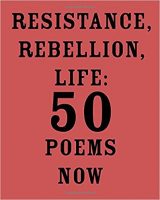
In a political atmosphere where language and even meaning itself are continually under threat, poetry has a critical role to play. And our poets have been responding—in the streets and at their desks, demanding a full accounting from themselves and from their nation. Majmudar's elegant introduction to these vital poems reminds us that "false stories take a lot of killing because they are made of language. Because they are made of language, though, they can be killed." From Solmaz Sharif and Eileen Myles to Kevin Young and Juan Felipe Herrera, American poets of diverse styles and strategies have contributed their truths: scenes from the front lines of resistance, and from the interior of our collective conscience.
The Half-Finished Heaven: Selected Poems by Tomas Transtromer
[Paperback] Graywolf Press, 154 pp., $16.00
Tomas Tranströmer’s celebrated career earned him a place among the twentieth century’s essential global voices. Translated into more than fifty languages, his poetry draws readers to its power and resonance, its shaping of landscapes both outer and interior, stark and yet alive to the luminous. In 2011, Tranströmer was awarded the Nobel Prize in Literature “because, through his condensed, translucent images, he gives us fresh access to reality.”
Bye-Bye Land by Christian Barter
[Paperback] BOA Editions, 112 pp., $16.00
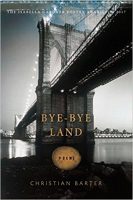
This Isabella Gardner Poetry Award-winning book-length poem is a medley of voices in dialogue with each other—overheard, remembered, and internal—that represents a mind at work as it considers the destructiveness of human nature, the hypocrisy and artifice of the American dream. Voices from personal conversations, political speeches, Guantanamo detainees, news reports, and famous poets fill these pages, ultimately capturing a world of disrupted beauty and unrealized potential.
Feel Happier in Nine Seconds by Linda Besner
[Paperback] Coach House Books, 80 pp., $17.95
This collection is a universe where minimalism and maximalism work in harmony. Ethics, economics, glamour and alternative physics are just a few of the vehicles Besner uses in her jaundiced pursuit of knowledge and joy. At the collection’s core is a series of brilliantly illuminated poems patterned on a scientific study of synaesthesia and Fisher Price refrigerator magnets. Besner’s courageous comparisons and musicality provide the critical happiness we all need.
The Nightlife by Elise Paschen
[Paperback] Red Hen Press, 80 pp., $16.95
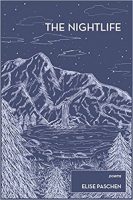
In Elise Paschen’s prize-winning poetry collection, Infidelities, Richard Wilbur wrote that the poems “. . . draw upon a dream life which can deeply tincture the waking world.” In her third poetry book, The Nightlife, Paschen once again taps into dream states, creating a narrative which balances between the lived and the imagined life. Probing the tension between “The Elevated” and the “Falls,” she explores troubled love and relationships, the danger of accident and emotional volatility. At the heart of the book is a dream triptych which retells the same encounter from different perspectives, the drama between the narrative described and the sexual tension created there.
In a political atmosphere where language and meaning itself are continually under threat, poetry has a critical role to play.
Correspondences
Paul Muldoon
by Lance Rutkin
Rutkin: You were just in Dublin, right?
Muldoon: I was.
Rutkin: How was it?It was the centenary of the 1916 Rising, Easter Week, so I was involved in a couple of projects there. One of the interesting things about being a poet is that much of what one writes is commissioned in some ways. It could be as simple as someone asking for a poem for a magazine, and one doesn't have one, so one writes one, or something more formal, along the lines of what I've just done in Dublin. The main thing I did was the text for a piece that was composed for an orchestra and a chorus of about 1200 people, and it was called "One Hundred Years a Nation," music by Sean Davey, presented in Collin's Barracks, which is the old British Army headquarters in Dublin, and presented on Easter Sunday.
Claudine Rankine: "I Think We Need to Be Frightened"
by Emily Temple
Claudia Rankine took the stage at BAM on Tuesday night as part of the venue’s Eat, Drink, and Be Literary series (presented in partnership with the National Book Foundation)—one of my very favorite arts programs in New York. Even before she spoke, during the eating and drinking portion, the atmosphere felt charged, buzzy and expectant—much more so than it had been the previous week with Ben Lerner. Don’t get me wrong—Lerner was wonderful, and I maintain that he is essential to the future of literature, but in retrospect, his event seems polite, academic, and perhaps a bit distant from the current concerns of many of the audience members. In contrast, the crowd on Tuesday night—who had all just gotten the news that James Comey had been fired—looked to Rankine as a prophet or a seer, some kind of utterly un-hokey guru.
“I think we need to be frightened.” – Claudia Rankine
Envoi: Editor’s Notes
Lessons from the Past: Czesław Miłosz
"Literature is born out of a desire to be truthful—not to hide anything and not to present oneself as somebody else. Yet when you write there are certain obligations, what I call laws of form. You cannot tell everything. Of course, it’s true that people talk too much and without restraint. But poetry imposes certain restraints. Nevertheless, there is always the feeling that you didn’t unveil yourself enough. A book is finished and appears and I feel, Well, next time I will unveil myself. And when the next book appears, I have the same feeling. And then your life ends, and that’s it."
—from The Paris Review "Czeslaw Milosz, The Art of Poetry No. 70"
Interviewed by Robert Faggen